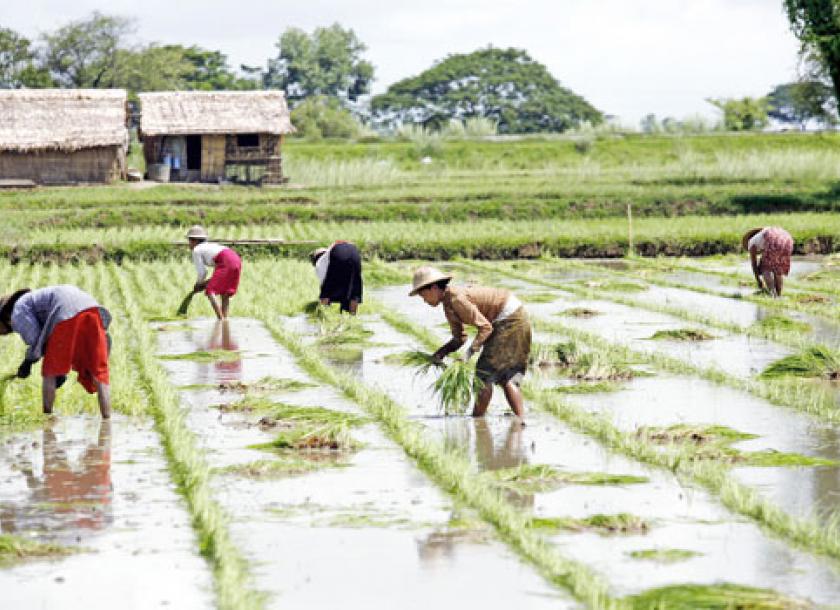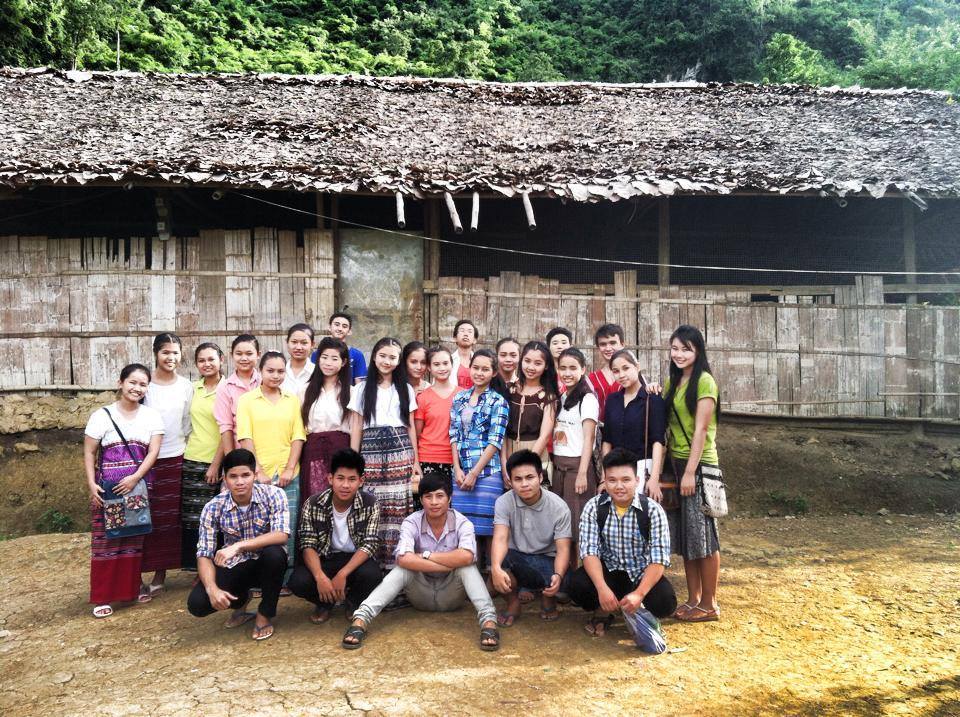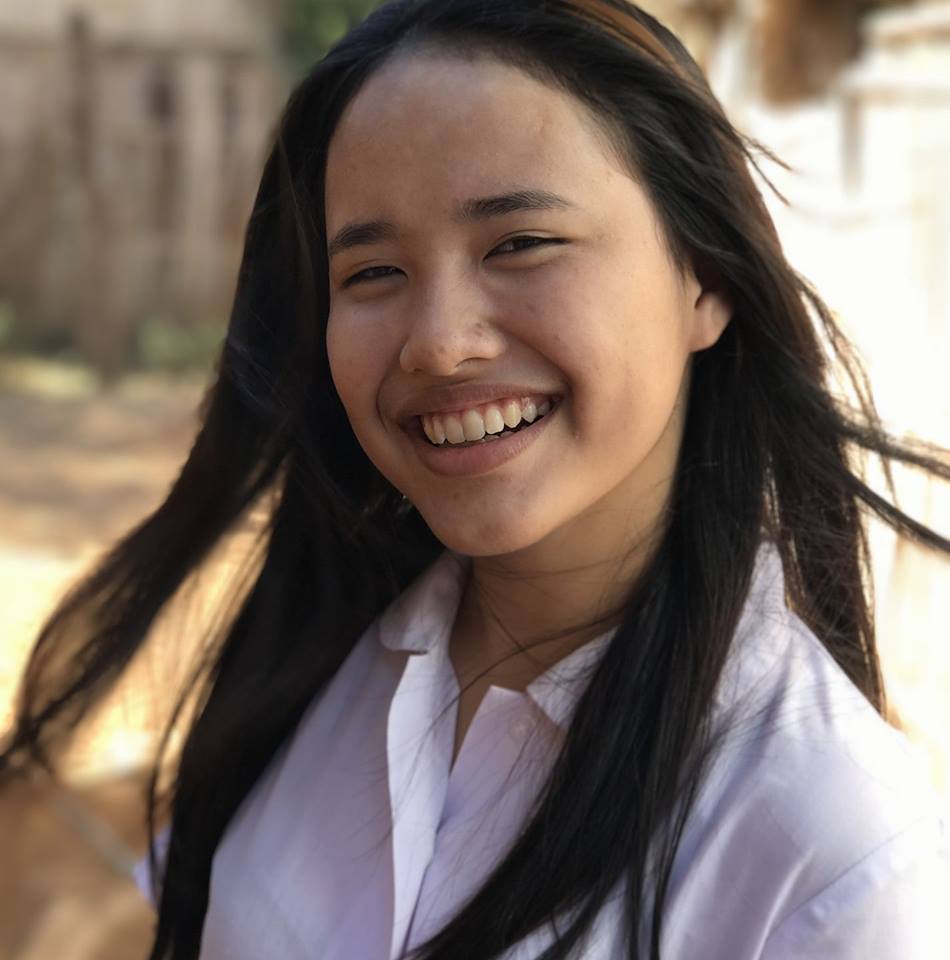A seven year-old girl travels with her family from her home in southern Shan State, Burma, to the Maela Refugee camp in Tak, Thailand. The long and arduous journey takes the family of five (mum, dad and two sisters, aged four and 14) four days by bus, with numerous stops along the way to walk through army checkpoints. Behind them, the family farm smoulders, burnt to the ground by the Burmese military because the child’s parents refused to turn their small, subsistence farm into a commercial castor-oil enterprise for the government. The little girl would go on to spend the next 10 years of her life in the largest refugee camp on the Thai Burmese border. Today, along with her older sister, she now enjoys life outside the camp. But her parents and younger sister remain.
That little girl is called Julia. Soon, she will turn 20. And she has just entered the second semester of a four-year Bachelor Degree in Communication Arts at Bangkok University. Julia is pretty, petite, vivacious and bursting with positivity. She speaks energetically and passionately about her studies, the opportunities she has received in the last few years, and about growing up in the refugee camp. She has little memory of life before.
Becoming a refugee
As part of a drive to develop bio-fuel resources for export, in 2005 the Burmese military regime began systematically ordering small local farmers to grow castor oil. Those who refused, especially in southern Shan State, had their land confiscated. Villagers found themselves working as forced labour to plant seeds. Others, including Julia’s family, were compelled to leave their homes and livelihoods behind and become reluctant migrants.
Farmers in Myanmar
For many, like Julia’s parents, farming was all they knew; and all they felt able to do to survive. Julia explains, “Both my parents were illiterate. There was no other job they could do. If they grew castor oil for the government, what would the family eat? They didn’t want to give up their farm, so the government burnt it down. The other villagers advised us to leave for our safety. That’s why we moved to the refugee camp.”
Ethnically Lisu, Julia and her family were more marginalised than most. With Tibetan-Burman roots, the Lisu in Mayanmar form a population of approximately 600,000. The majority, 85%, are Evangelical Christian. Maela is by far the largest of Thailand’s northern refugee camps, comprising some 6,700 households, amounting to about 37,000 people (The Border Consortium, August 2018). Julia recalls that her family faced prejudice and opposition inside the camp because of their background. Even Karen inhabitants, who make up the majority of the camp’s population, were wary of them and often accused them of being spies for the government! “Most of the people in the camp had suffered at the hands of the Burmese military”, says Julia. “They burned their houses and killed their wives! But we also faced opposition from the Karen people in the camp. They threw stones at our house.”
Inside the camp
It is an understatement to say that life in the refugee camp was (and is) in any way easy! In addition to the risks to the safety, health and wellbeing of individuals, particularly girls and women, parents face the challenge of how to earn a basic salary in order to feed their families. It is illegal to travel outside the camp without the appropriate documentation which is difficult and expensive to obtain. And the consequences for those who do, if caught, can be dire. Education for children presents its own challenges!
Though schools teaching in Karen, and a small number in English, do operate in the camp, for children such as Julia and her siblings who grew up speaking Lisu and Burmese, this was not ideal. At first, it was very difficult for Julia as she could not understand her teacher’s language. Now, she is fluent in Karen, Thai and English!
“We are always facing challenges! But I am one of the lucky ones.”- Julia
Initially, school and studies were a struggle but Julia worked hard. She was eager and determined to learn. She studied up to Grade 11 in the camp school, an achievement which for many children soon results in an educational dead end! Certificates and awards are not officially recognised beyond the camp.
Hope for a Way Out
Each year the Minmahaw Higher Education Program (MHEP) visits the refugee border camps to select students to study at the migrant schools in Mae Sot. The selection process is rigorous, with only 24 places available for hundreds of children from 9 camps. Only those from the most disadvantaged backgrounds are chosen. Then, they must sit through an interview and an exam.
According to the Burmese Migrant Workers’ Education Committee (BMWEC), migrant schools on the Thailand-Burma border are continually faced with budget difficulties. One consequence of this is that the matriculation exam pass rate at Burmese migrant schools in Mae Sot remains very low, compared to the national average in Thai schools. However, that said, migrant students gain skills they would otherwise be denied within camp schools. In addition to being able to study for their GED, the schools help students prepare for what’s ahead, as Julia explains:
“I’m very grateful to the school. The school is very nice. It changed half of my life. I didn’t know how to write essays, apply for scholarships, how to write a CV - everything! The school trained us for everything and helped us prepare.” Through the school Julia was also able to obtain a passport. Crucial if she was to achieve her dream of studying at the university in Bangkok.
For migrant students, higher education is beyond reach without sponsorship. As international students, tuition fees, administration costs and living costs unavoidably exceed those of local students. Following unsuccessful applications to several NGOs, Julia heard about Daughters Rising’s scholarship programme through a friend. She applied - and was accepted. “At that time, I was so happy I cried!” says Julia. With sponsorship behind her, Julia was able to focus on studying for the University entrance exam which she sat in May 2018. She passed, and was accepted into her degree course. But there was still a long way to go. Julia had to learn how to fly!
Busy bustling airports, check-in desks (if we can find them) and immigration can be daunting experiences for many of us even if we are seasoned travellers. Imagine how challenging this must have been for a teenage girl, far from her family, taking a flight for the first time alone, and having to communicate in a language that is not even her second language!
“After I got my acceptance letter from the school I had to go back to Yangon to the Thai embassy to get a visa. And then to come legally into Thailand we have to come by flight. That was the first time I went on a plane.
“I travelled by myself!
“I felt so nervous because I never flew before! But I can’t just rely on others so I searched on Google how to do the check-in and how to go there and I had to prepare a lot! The second time I came to Bangkok [to start at University], I took a flight too!”
University and beyond
When asked about life at university, Julia speaks excitedly about her studies, an arts-based degree that ‘prepares students to meet the challenges and demands of the ever-changing field of communication by providing a broad range of communication skills.’ (Course prospectus). She explains some of the challenges she continues to face as a student from Burma living in Bangkok; and shares with us about her hopes for the future, after completing her degree:
We learn about technology and how to make presentations. We listen to motivational talks from visiting female industry / business leaders. We learn about the culture of other countries. This helps students to think critically; to form different perspectives. The course is really interesting. It really opened my mind. The course is taught in English but most native speakers don’t seem to care. Often they don’t come to school even! But we [overseas students] have to sit in the front row because we have to really study.
I have never been in a big city like this before. The first time I was in Bangkok I was so afraid to use the escalator. And even in the elevator I didn’t know what to press. I had to wait for someone to come and wait for them to press it! It’s kind of scary but funny too. I learnt a lot this year. I was really productive this year.”
Julia has also faced her fair share of prejudice living in Bangkok, despite being a student at the university, as she explains:
When walking along the road, most people assume I am a maid. They ask me which house I am working at. Or they ask, ‘Are you a cleaner at school? Most of the professors at my school are not biased. They give a chance to those who are eager to study, I have only completed one semester so far so I don’t have many friends. There is only one guy from Burma. Most of the foreign students are rich or Thai. The other students want me to hang out with them all the time but I cannot because I don’t have money and I have to study. So I stay by myself. Many of them are not serious about studying. But for me it means there are many challenges. But I don’t really care about that. I am learning for my future. After my studies I want to work for Burma Link. If the border refugee camps close, this is an organisation that will help people who get repatriated to Burma. They will serve as mediators between the returning refugees and the local community where they will go to stay. My dream is to work for that organisation, or another NGO. I want to help others, to give back. My Plan B, if the Thai government allows people to stay, is to work for another NGO that helps promote the education of the refugee children.”
Julia has come a long way since leaving her farm - her home - as that little 7 year old girl almost 13 years ago. It has been a lonely journey and understandably she misses her family very much. She last saw them over 7 months ago.
“Sometimes when I study I feel very depressed. But I remember, I feel, that I am the lucky one among my family and my relatives. Most people in the camp cannot even go outside of the camp. When they finish grade 12 they just get married and have kids. Even though I face difficulties, I am always pleased with my current life. Now, I can help others.”
About Julia’s degree programme
Course: Bachelor Degree in Communication Arts, Bangkok University
Total duration : 4 years
Semester duration : 14 weeks. One academic year is two semesters of 14 weeks each with optional summer courses. (If students opt in to the summer courses, this cuts the total duration of the degree to 3.5 years.)
Tuition fee/semester (for international students): 65,000 THB
Non-residential fee/semester : 10,000 THB
Accommodation, food & general living expenses / semester: 28,000 THB
Total costs/semester : 103,000 THB / Approx. $3,230 USD
MAKING AN IMPACT
In 2017, Daughters Rising sponsors 7 girls from local Karen communities and refugee children from Burma, through University programmes in Chiang Mai and Bangkok.
As a small grassroots organisation we have very limited resources. Funds quickly become exhausted. But we are passionate to provide more girls like Julia with opportunities to further their education; education which in turn leads to empowerment, employment, and the confidence to inspire others.
Almost without exception, the girls and young women that Daughters Rising has supported to date, either through community-based projects, higher education, or within our Chai Lai Orchid hospitality training programme, have expressed a desire to return to their home villages in northern Thailand or Burma, to support their local communities in some way. They wish to become educators themselves. Or start their own home stays, restaurants or other small businesses. Like Julia, they aim to use their opportunities to help others!
Additional sources:
BNI Multimedia Group, 2009. Myanmar Peace Monitor
Kathrin Wessendorf, The Indigenous World, 2008









